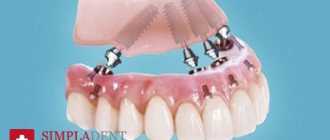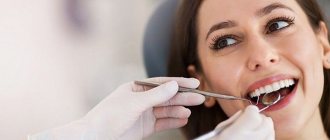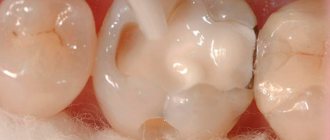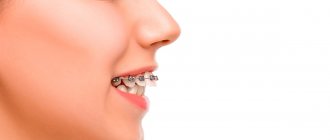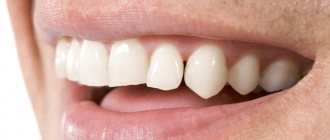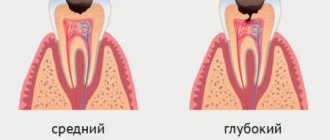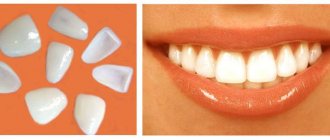The presence of any of the above factors suggests that the child’s teeth are in poor condition. But does this give us the right to talk about hereditary predisposition? Even from the point of view of official science, the answer to this question cannot be as unambiguous as we would like.
The fact is that caries, periodontal disease and any other dental disease are not hereditary. Parents having tooth decay does not mean that their child will have the same problems. Statistics tell us that more than 95% of adults have at least one filling, which means that caries cannot be the result of a combination of chromosomes. In reality, it is the result of a combination of a number of internal and external factors.
That is, from a medical point of view, bad teeth, as an isolated condition/disease, cannot be transmitted genetically. But some of the factors that contribute to the development of caries may depend on heredity. In other words, a predisposition to a particular dental disease still depends on the resources that parents provide. Genes can determine:
- Composition, color, thickness of enamel;
- Shape and structure of teeth;
- Bite geometry;
- Metabolism;
- Composition of saliva and oral microflora;
- Schedule for the eruption of primary and molar teeth.
The lifestyle of the family in which the child is planned and raised plays a huge role in the extent of this negative genetic baggage. First of all, the responsibility falls on the expectant mother, since the baby’s dental apparatus is also formed in her womb. Now let’s look at each of the factors separately, paying attention to the etiology and methods of control.
Many people are interested in the question of whether heredity really affects the condition of teeth. It is worth noting that scientists have been studying this problem for a long time. Even at the end of the eighteenth century, observations were made during which it was possible to identify an obvious connection between the development of dental diseases in children according to the same pattern as in their parents living in the same area. Caries appeared in descendants at the same age, on the same teeth, in the same sequence.
Despite the obvious connection between genetics and dental health, there are many other factors that can influence their condition. Of course, heredity is an important factor in oral health, but it is far from the only one and not so clear-cut.
Bite
In medicine it is defined as the relationship of closed jaws. Normally, they are positioned for effective biting and chewing. If the lower jaw protrudes strongly forward or, conversely, is abnormally shifted back, an abnormal bite occurs. One of the reasons for such shifts may be genetics.
An incorrect bite cannot be ignored, as it leads to poor digestion and premature wear of the enamel. In addition, this pathology distorts facial features, making it disproportionate.
Today, malocclusion can be corrected not only with the help of braces. It is much faster and more comfortable to do this using invisible mouth guards.
Periods of teeth eruption and loss
Normally, the replacement of baby teeth with molars begins at 5-6 years of age. It happens that indicators vary depending on individual characteristics. A year or two in both directions, as a rule, is not considered a deviation. It's just heredity. How long teeth will serve the owner is also largely determined by genetic factors, but not only by them.
Unlike teething, the speed of which is almost impossible to influence, the longevity of natural teeth depends on us. A nutritious diet, regular hygiene (both at home and professional), and timely visits (at least once every six months) to the dentist will help preserve your teeth for a long time.
What factors influence dental health?
One of the main factors determining the dental health of every person is his lifestyle.
Imagine a person who does not perform basic hygiene procedures, smokes a lot, eats only sweets, and then, losing teeth, complains about bad genetics. This looks absurd. Sometimes a predisposition to caries and other dental diseases begins in childhood, when there are not enough vitamins and calcium for the normal formation of tooth enamel.
It is worth noting that caries itself is not considered a hereditary disease. A person may only have a predisposition to its appearance on specific teeth, since the structure of hard dental tissues is determined by genes. This means that if the parents’ lower teeth were primarily affected by caries, the child is also predisposed to pathology of the same localization. Sometimes genes are inherited not from parents, but from grandparents or other ancestors. In all these cases, compliance with preventive measures will avoid the development of the disease.
If caries has already developed, treatment is recommended to begin as soon as possible. Perhaps, after some time, medicine will make great strides forward, each patient in a dental clinic will have his own genetic map, but for now, effective treatment of caries and other dental diseases is carried out without taking into account the genes of a particular person.
The health of your teeth always remains in your hands. Use knowledge about hereditary predisposition to dental diseases, and do not neglect preventive measures. The most important thing that will help protect your teeth is regular visits to the dentist and careful oral hygiene.
Very often in line at the dentist you can hear: “I have bad teeth - it’s heredity. Both my mother and my grandmother had bad teeth.” But dentists say that heredity has absolutely nothing to do with it. Of course, genetics can play a role, but it is so insignificant that it has absolutely no effect on the growth and formation of teeth, or the strength of tooth enamel.
Although, of course, the influence of mother and grandmother has a certain effect on the condition of the teeth. And if in this family it was not customary to carefully care for their teeth, they simply cannot be healthy. If the grandmother did not know how to brush her teeth correctly, she could not teach it to her daughter, and she, accordingly, to her child. If a mother thinks that she doesn’t need a snow-white smile, then her daughter or son will most likely never use whitening strips
.
What else does “heredity” affect?
Such heredity can lead to very unpleasant results. A person who is sure that he has bad teeth from birth simply stops fighting his problems, deciding that he cannot save his teeth. As a result, teeth brushing occurs irregularly and without due diligence. To improve the condition of your gums, you do not use rinses, gels, dental floss, a tongue scraper, or much more. In addition, such a person rarely seeks help from a dentist. A trip to the clinic will be possible only as a last resort, when the tooth can no longer be saved and should be removed.
How to fix the situation?
First of all, it is necessary to remember that the condition of teeth depends on how carefully they are cared for. To do this you will need to follow certain rules:
- Visit the dentist regularly and not only when problems arise. For preventive purposes, dentists are visited at least once every six months.
- Brush your teeth twice a day. Select a brush and toothpaste in accordance with the characteristics of the body, and taking into account the current condition of the teeth.
- As additional dental care products, use dental floss, balms and rinses, and teeth whitening products at home
. - If teeth are removed, prostheses are installed in their place: bridges, crowns, implants.
- Carefully control your daily diet, eat dairy products, solid vegetables and fruits, nuts, herbs, and berries every day.
Those who want not only to keep their teeth healthy and beautiful, but also to provide such an inheritance to their children, need to teach them hygiene from a very young age, talk about the importance of visiting the dentist and about proper nutrition. Using whitening strips
and it’s better to put aside pencils for later. Not forgetting, at the same time, to ensure the whiteness of your own teeth.
Recent studies have shown that mothers who have bad teeth give birth to children who will also have dental problems later in life. And this is confirmed by clinical dentistry and specialists around the world.
This study was carried out over 27 years in New Zealand. People who were born from 1972 to 1973 took part in it. And it turned out that if the mother’s teeth had a lot of fillings, and the woman also suffered from caries, then the children of these mothers also began to suffer from dental diseases at an early age.
Throughout this period, 100 people were examined. The children and their mothers visited the dentist for the first time when they were 5 years old. During this period, the condition of the teeth of the child and his mother was recorded. A repeat study was conducted when the children were already 32 years old. And the data obtained from these grown children was compared with the data that was obtained during examination of the mothers. The result was disappointing.
It turned out that more than half of all children whose mothers suffered from severe dental problems also began to complain about the poor condition of their teeth, and most often it was caries. A quarter of the grown children were already missing some teeth by the time of the re-examination.
The British Dental Foundation decided to comment on these data. According to the director of this foundation, they have known for a long time that dental health is transmitted genetically, and only now have they found confirmation of their theory. This means that parents with bad teeth should take care not only of the health of their teeth, but also of the health of their children’s teeth. And this needs to be done almost from the very moment the first tooth appears.
Careful dental care, visiting the dentist every 6 months and Damon Clear braces, which help correct many dental problems, can save the situation. And if you follow all these rules, the child’s teeth will remain healthy and beautiful throughout his life.
Related materials:
- British scientists conducted a study of the DNA of cancer tumors. After a series of studies conducted at the London Center, scientists came to the unanimous conclusion that cancer can...
- The addiction to coffee is inherent at the genetic level. Experts from Harvard studied the issue of people's addiction to coffee. During their research, they made a sensational discovery - the addiction of some people...
Very, very, very often dentists hear from their patients: “Doctor, my teeth are so bad, but it’s because of my mother and grandmother, and in general all my relatives have the same problems with their teeth. So it's normal and I'm not surprised by all my oral problems." One gets the impression that it is easier for them to live this way, with the awareness that it is not they who are to blame for their health problems, but genetics...
Of course, many factors influence our health, and genetics is not the least important. The following things have the greatest impact on our body:
- Heredity.
- Ecology.
- Nutrition.
- Lifestyle.
- Stress.
- Bad habits.
Of course, heredity is a fundamental factor, the foundation of our health. But not everything depends on this factor.
When talking about dental health, we most often deal with basic laziness and unwillingness to take care of our own oral cavity. People take more care of their facial skin, hair and nails than of such an important structure in our body as teeth. This happens for an obvious reason - teeth are not as visible as hair... Most people may not brush their teeth in the morning and say as an excuse that they simply didn’t have enough time, but they will never leave the house with dirty hair and unmade up eyes...
This is the problem of most of the population; they worry about their appearance and neglect their own health. Although beautiful, clean, white teeth and fresh breath play a huge role in a person’s life
.
In this situation, our Healthcare is partly to blame, which is not at all involved in educating the population on such issues. And such knowledge should be laid down in childhood and over time passed on from generation to generation. No matter how sad it is, our mothers and fathers do not know how to brush their teeth correctly
...no one taught them this. It’s not surprising that we repeat the same mistakes and teach our children how to brush their teeth incorrectly...
Size, shape, position of teeth
The jaw size, shape and number of teeth of primitive man were very different from those of modern man. And the reason for this was the food that people ate in ancient times: raw meat, grains in a rough shell, bark.
In the process of evolution, humans have fewer teeth, their size has decreased, but genetics still determines their physical parameters. How big, small, rare and sharp teeth you get depends directly on what kind of teeth your ancestors had.
However, this does not mean at all that you need to come to terms with what you inherited. Modern dentistry has a wide range of tools, methods and equipment so that you can get the teeth of your dreams.
The most important thing is to brush your teeth properly
Whether heredity is good or bad, if you do not take proper care of your oral cavity, problems will inevitably arise sooner or later. Some people have caries, others have periodontitis, but there will be problems! Satisfactory oral hygiene is the key to healthy teeth, even those with not very good heredity.
We do not take into account serious diseases when the formation of teeth fails even before they erupt. These diseases include:
- Enamel hypoplasia.
- Enamel hyperplasia.
- Drug-induced disorders of tissue development.
- And also hereditary disorders.
We are talking about the average person with normal health. Each person has one or another predisposition, but if prevention is carried out correctly, the disease itself can be prevented
. Nowadays, to be healthy, you need to make a lot of effort. Proper nutrition, exercise, personal hygiene, self-care, etc., all this requires not only time, but also willpower, which, unfortunately, not many can boast of.
Enamel
Its thickness, composition and even shade also depend on genetic characteristics. They affect not only the external attractiveness of teeth, but also their health. Normally, the thickness of the enamel should be in the range of 1.6-1.7 mm on the chewing surface.
If the actual parameters are smaller, this is fraught with premature abrasion for the enamel, and the appearance of caries for the teeth. Those who naturally have thin enamel with a bluish tint should not despair. With the help of remineralization and lamination procedures, various types of dental onlays (crowns, veneers, lumineers) you can easily compensate for this moment.
Composition of saliva and microflora in the mouth
There are about 700 different bacteria in the oral cavity at the same time, and there are hundreds of millions of them in total. Not all of them are favorable for us. The balance of beneficial and pathogenic microflora is largely determined by heredity, in particular due to saliva, which can have different levels of acidity and contain different amounts of mineral and organic components.
Properly selected toothpaste and mouthwash can not only effectively protect teeth from caries. With their help, you can create a favorable environment for the proliferation of beneficial bacteria and suppress the excessive activity of pathogenic microflora. Only a dentist can determine which products will be optimal after an examination.
As you can see, genes are very important in matters of beauty and dental health, but they have long ceased to play a decisive role. Today there are practically no dental diseases, pathologies and dysfunctions that dentists cannot eliminate.
Curvatures of any complexity and scale, severely damaged teeth and even complete edentia (lack of teeth) are no longer considered something out of the ordinary and can be corrected.
Moreover, modern technologies make it possible to solve dental problems quickly (restoration, production and installation of an onlay and even a tooth can now be done in just an hour) and absolutely painlessly (computer anesthesia and sleep treatment are actively used today), but provided that you contact respectable dental center.
Other factors affecting dental health
Heredity is just one factor. The influence on the human body in general and teeth in particular is exerted by:
- ecological situation;
- food intake and diet;
- Lifestyle;
- regular anxiety and repetitive stress;
- smoking, drinking alcohol, other bad habits;
- woman's behavior during pregnancy;
- infant habits of sucking fingers, pacifiers and other objects.
Even if there are relatives with an “ideal” tooth structure and an even bite, the lifestyle of the expectant mother will affect the formation of tooth buds in the fetus.
During pregnancy, people think about the health of the baby’s body and teeth. That's why:
- treat emerging diseases in a timely manner;
- regularly observe the rules of oral hygiene;
- do not use medications without the consent of your doctor - some of them can affect the color and thickness of enamel, for example, tetracycline;
- balance your diet, eat healthy foods and avoid unhealthy ones;
- normalize your sleep schedule, do not overexert yourself physically.



